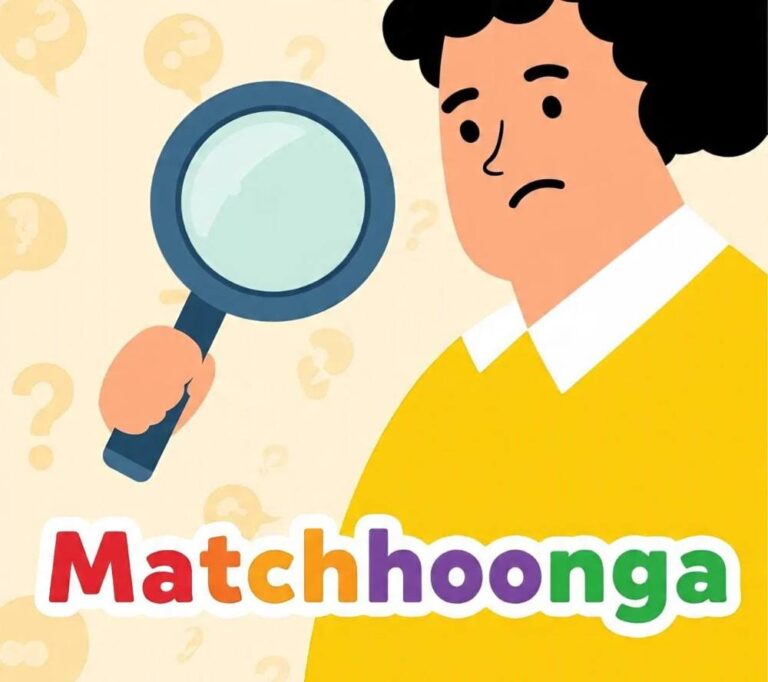In the evolving landscape of online communication, certain phrases rise to popularity, gaining attention for their uniqueness, emotional depth, or pop culture relevance. One such term is “matchhoonga”—a word that has sparked intrigue, confusion, humor, and discussion across digital platforms.
Whether you’ve seen it in a meme, heard it in a dramatic reel, or come across it in comments, you might be wondering: what does “matchhoonga” actually mean? Why is it used so often? And what’s behind its viral rise?
This comprehensive article takes a closer look at matchhoonga, its meaning, linguistic origin, context in modern digital culture, and why it resonates with so many users today.
Understanding the Word “Matchhoonga”
Linguistic Origin and Literal Meaning
“Matchhoonga” (or “मचाऊँगा” in Hindi transliteration) is derived from the Hindi language. It’s a first-person future tense verb that roughly translates to “I will cause chaos” or “I will stir things up” in English.
Root verb: मचाना (machana) – to cause, to stir, to create uproar
Tense and person: Future tense, first person singular
Translation: “I will create (a scene/ruckus/chaos)”
Colloquial Usage: Often used to express strong emotion or determination
In simple terms, someone saying “matchhoonga” is making a bold statement of intent—whether to take action, fight back, disrupt, or respond with intensity.
How “Matchhoonga” Gained Popularity Online
Pop Culture and Meme Culture Influence
The term “matchhoonga” became widely recognized through viral memes, Instagram reels, and TikTok trends, where it was used as part of dramatic dialogues or exaggerated emotional expressions.
Some of the reasons behind its viral popularity include:
Emotional power – It conveys drama, passion, and intent
Versatility – Can be used in both humorous and serious contexts
Cinematic feel – Sounds like a powerful movie line
Language blend – Appeals to bilingual speakers (Hindi + Hinglish)
One notable trend featured a slow-motion video with intense music and a caption like “Usne mujhse jo kiya… ab main matchhoonga” (“What they did to me… now I will cause chaos”).
Common Contexts Where “Matchhoonga” Is Used
The beauty of this word lies in how it’s adapted across different situations:
1. In Memes
Memes often depict someone being calm or hurt in the first frame and then “matchhoonga” in the next—indicating a dramatic reaction.
> Example:
Caption: When your boss says “Work on Sunday”
Image: “Matchhoonga.”
2. In Personal Posts or Reels
Used to express emotions like heartbreak, betrayal, revenge, or determination. Often paired with:
Sad music
Black-and-white filters
Movie-style narration
> Example reel text:
“Waqt aayega… tab main matchhoonga.”
(“My time will come… then I will unleash.”)
3. In Motivational or Emotional Quotes
Some creators use it as a declaration of power or change, often in response to a personal failure or life event.
> “Mujhe underestimate karne walon ke liye ek din main matchhoonga.”
(“To those who underestimated me, one day I will rise.”)
The Psychological Appeal of “Matchhoonga”
Why do people connect so deeply with this word?
1. Expression of Repressed Emotion
Many users identify with feeling silenced, rejected, or underestimated. Saying “matchhoonga” is a form of emotional release, giving voice to inner frustration.
2. Empowerment Through Words
The phrase acts like a personal war cry — it’s a reminder of self-worth, strength, and transformation.
3. Relatable Across Ages
While younger users dominate meme culture, even adults relate to the emotion behind “matchhoonga,” especially in personal, relationship, or career contexts.
Impact on Social Media and Content Trends
The keyword “matchhoonga” is now used not only in posts but also in hashtags, YouTube comments, community memes, and dialogues. Its cultural presence is growing, and marketers have started using it subtly in regional advertising to tap into emotional engagement.
Some popular hashtags include:
#matchhoonga
#desidrama
#breakupquotes
#hindimotivation
Related Phrases and How They Compare
To understand “matchhoonga” better, let’s look at similar Hindi phrases that convey intent or emotion:
Phrase Meaning Tone
Tod dunga I will break/destroy it Aggressive
Sabak sikha dunga I will teach them a lesson Vengeful
Badla loonga I will take revenge Intense
Matchhoonga I will cause chaos / rise dramatically Emotional
Among these, “matchhoonga” is more dramatic and expressive than aggressive. It balances emotion with power, making it a favorite for creative expression.
Matchhoonga in Entertainment and Cinema
Some social media users believe the word has roots in Bollywood-style dialogues where characters often promise dramatic vengeance or transformation. Though not a coined phrase in film, the word fits the tone of Indian cinema.
Fan-made dialogues include:
“Tumne kya socha, main chup rahunga? Main matchhoonga.”
“Zindagi ne mujhe dard diya… ab main matchhoonga.”
This cinematic tone boosts the relatability and reusability of the term.
SEO Trends and Search Intent Behind “Matchhoonga”
Let’s explore why this word is trending in search engines and what it means for content creators:
1. Search Volume Growth
The term “matchhoonga” shows increasing search interest in India, Pakistan, and the South Asian diaspora abroad. People often search it to:
Understand the meaning
Copy for meme creation
Translate to English
Use in captions or reels
2. Long-Tail Keyword Variations
Some examples include:
Using these variations helps in creating SEO-rich content without overstuffing the main keyword.
Tips for Creators: Using “Matchhoonga” Effectively
For Meme Pages:
Use it with relatable daily frustrations — like school, work, friendships, etc.
For Reels/Shorts:
Pair it with cinematic sound effects and emotional monologues.
For Writers:
Incorporate it in fiction or poetic stories as part of a character’s dialogue or emotional arc.
For Brands (Carefully!):
If you’re targeting Gen Z or desi meme audiences, subtle references in marketing can boost relatability. Just be careful not to mock or misuse the emotion behind it.
Responsible Usage: Cultural Respect and Sensitivity
Though fun and expressive, it’s important to use “matchhoonga” in appropriate contexts, avoiding mockery or misrepresentation. Content that overuses or misuses regional language terms can sometimes face backlash.
When used with respect to its emotional weight and linguistic roots, the term adds richness to storytelling and digital identity.
Final Thoughts: More Than Just a Word
“Matchhoonga” is more than a trending phrase. It’s a digital expression of resilience, emotion, and self-transformation. Its popularity reflects how people use language to cope, connect, and communicate in today’s emotionally charged world.
Whether it’s heartbreak, ambition, or sheer frustration, the word allows people to channel powerful feelings into a single line — making it perfect for the fast, expressive nature of internet culture.
So the next time you see “matchhoonga” in a reel or post, know that it carries a story — a story of someone ready to rise, react, and reclaim their voice.

Christopher brings fresh perspectives through his writing, covering real-world insights and thought-provoking ideas. He regularly contributes to urbanmatter.com.in, engaging readers with quality guest content.

